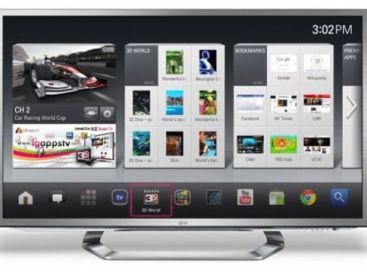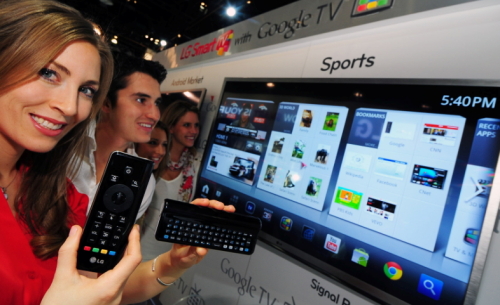According to the company’s plan, it will display the new TV set in New York through U.S. retail giant Best Buy with plans to expand into other regions like Europe and Brazil. However, it is still uncertain whether LG’s Google TV will be launched in Korea.
Together with the new TV set, the company will also feature a gesture-based remote controller which comes with a QWERTY keyboard. The firm’s Google TV was first unveiled at the Consumer Electronics Show in Las Vegas earlier in January.
The move to roll out the new TV later this month indicates that LG Electronics will become the first to launch the new second generation of Internet-enabled Google TVs, a move expected to be followed by other industrial giants such as Samsung Electronics, Sony and Vizio. It is also seen as a move for California-based Google to widen its alliance to fight the forthcoming Apple TV.
Sony and Logitech previously unveiled Google TVs in the retail market last year, but ended up seeing disappointing sales with its initial partner Logitech later abandoning the technology.
As a result, Google is hoping that LG, the world’s second-largest TV maker, will boost its presence in the TV industry and increase sales with its value-added features like the 3-D function.
Backed by its 3-D enabled smart TVs and the new Google TV, LG plans to take up more than 25 percent of the global 3-D TV market this year. The company has already recorded the No. 1 position in five countries, including Brazil and Mexico in the first quarter of this year.
In the meantime, analysts here gave mixed views for the to-be-featured Google TV of LG Electronics.
“It’s a positive factor that LG is forming a close relationship with Google on top of news that the firm will become the third firm to manufacture the next Nexus smartphone,” said Noh Geun-chang, a senior analyst at HMC Securities. “Not just looking at the Google TV, the stronger partnership between the two indicates that Google has acknowledged LG’s technology and accepted the Korean firm as its partner.”
On the other hand, Kim Uno, senior analyst at Hanwha Securities, maintained a negative view on the launch of the Internet-enabled smart TV, stating that the global TV market is highly saturated and unable to produce increased demand.
“The TV makers are manufacturing the Google TV to create added value onto their premium TV sets, but I believe a limit exists considering the TV replacement rate,” he said, adding that the industry may see a downturn ― going into the minus range in terms of growth ― this year or the next.
By Cho Ji-hyun (
sharon@heraldcorp.com)






![[Exclusive] Hyundai Mobis eyes closer ties with BYD](http://res.heraldm.com/phpwas/restmb_idxmake.php?idx=644&simg=/content/image/2024/11/25/20241125050044_0.jpg)

![[Herald Review] 'Gangnam B-Side' combines social realism with masterful suspense, performance](http://res.heraldm.com/phpwas/restmb_idxmake.php?idx=644&simg=/content/image/2024/11/25/20241125050072_0.jpg)
